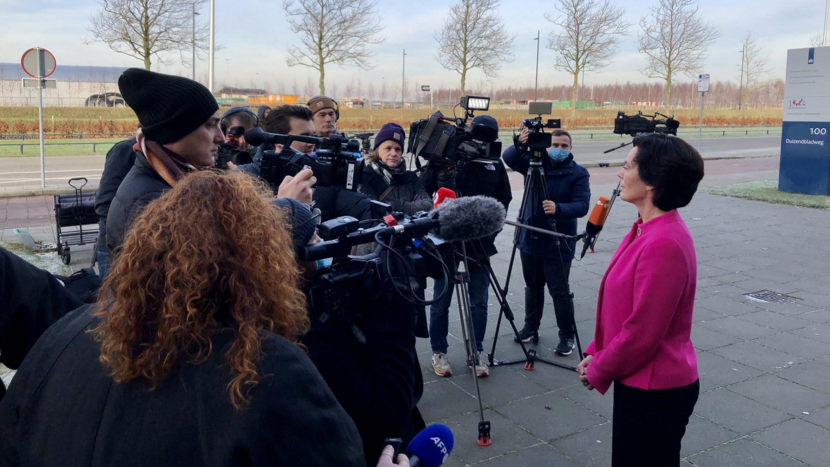Prosecution recommends life imprisonment for downing of MH17
The Netherlands Public Prosecution Service wants life sentences to be imposed on the four men suspected of downing flight MH17 in eastern Ukraine. According to the prosecutors, it has been proven that the defendants Girkin, Dubinskiy, Pulatov and Kharchenko are guilty of causing an aircraft to crash, resulting in deaths, and of the murders of the 298 people on board. In view of their essential roles in the downing of MH17, the Public Prosecution Service considers the four men to be main perpetrators, even though they did not actually press the button to launch the anti-aircraft missile that downed the plane. In the courtroom at the Schiphol Judicial Complex, the prosecutors said on Wednesday that only one punishment fits these crimes:
‘The downing was the result of an operation planned and organised by the defendants. Together, the defendants made a conscious decision to deploy an extremely destructive weapon with the aim of shooting down an aircraft. Each of the defendants can be held equally responsible for this joint deployment of the Buk TELAR. The downing of MH17 with a Buk missile brutally ended the lives of all 298 people on board. Incredibly deep and irreversible suffering has been caused to the next of kin. (...) The offences are by their very nature so serious and their consequences so great that, from the point of view of retribution, only the maximum prison sentence is appropriate in view of the injustice caused by the defendants.’
On 17 July 2014, Malaysia Airlines flight MH17 from Amsterdam to Kuala Lumpur crashes in eastern Ukraine, where an armed conflict is raging. All 298 people on board, from 16 countries, are killed. Investigation by the Joint Investigation Team has shown that the aircraft was downed by a Buk missile provided by a unit of the Russian army: the 53rd Anti-Aircraft Missile Brigade from Kursk. In March 2020, the Dutch Public Prosecution Service begins proceedings against four suspects: three Russians and a Ukrainian.
Abundant and convincing evidence
This week, the prosecutors summarised the extensive case file, which includes forensic material from the wreckage of MH17 and the bodies of the victims, investigations by forensic and other experts, hundreds of recorded phone conversations and other telecom data, and witness statements. There is also a lot of information from open sources: photos and videos of the Buk TELAR and social media posts – including messages posted by the defendants. Using the various sources of evidence, a reconstruction can be made of what actually happened prior to, during and shortly after the downing of MH17:
‘When viewed collectively and in relation to each other, all these different sources of evidence support and reinforce one another. Therefore, in the opinion of the Public Prosecution Service the evidence for the course of events on 17 July 2014 laid out in the indictment is abundant and convincing.’
Civil aviation brought within deadly range
From April 2014 onwards, the four defendants are members of an armed group fighting against the Ukrainian armed forces, by their own account as volunteers. As the fighters are suffering heavy losses and are unable to hit the enemy aircraft flying at high altitude, they request a heavier air defence system from Russia. Under the defendants’ leadership, the Buk TELAR they receive is brought to a strategic launch location, directly below a civilian aviation flight path. According to the prosecutors, the likelihood that the defendants were aiming for a Ukrainian combat aircraft does not detract at all from their guilt:
‘In the fighting, they decided to deploy a heavier weapon with an even greater range and even more destructive power than the ones they already had at their disposal: a Buk TELAR. In doing so, they brought civilian aircraft within their deadly range. The risk to civil aviation was also specifically foreseeable to the defendants. After all, it was widely known within their armed group that the airspace had not been closed and that passenger aircraft were flying over the conflict area.’
Indifference
The fact that they downed the aircraft in the course of an armed conflict cannot be taken into account in the defendants’ favour. The defendants were not regular military personnel and, what’s more, they demonstrated no respect whatsoever for international humanitarian law. The prosecutors hold it against the defendants that they have shown themselves to be indifferent to the risk of civilian casualties. The Public Prosecution Service also blames them for choosing not to explain themselves. After MH17 was shot down, they hid the Buk TELAR, had it driven away under cover of darkness and from then until this day they have tried to obscure their roles. Only the defendant Pulatov has employed lawyers; the other three defendants are not taking part in the proceedings and are being tried in absentia.

Next of kin
The MH17 trial is being followed by the victims’ friends and family, both in the Netherlands and elsewhere. More than a hundred of the next of kin made use of their right to address the court this autumn. And more than 300 next of kin have submitted claims for compensation. The prosecutors have said that in their opinion the defendants, if convicted, must pay this compensation.
The Public Prosecution Service has emphasised that it is only making a sentencing recommendation. It is up to the court to give a judgment. The trial will continue next year, with the defence’s statement of the case. A verdict is not expected before autumn 2022.
For the full text of the Public Prosecution Service’s closing speech as spoken in court, see www.prosecutionservice.nl/mh17/.